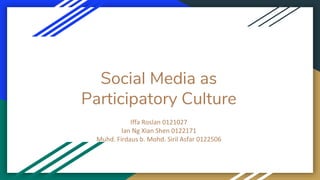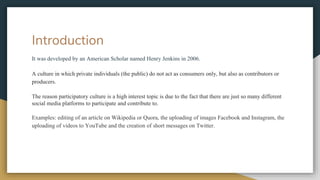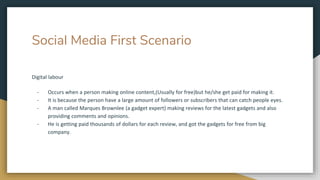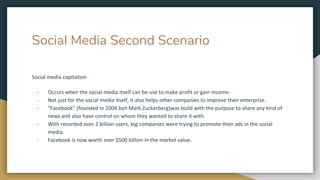Social media as participatory culture
- 1. Social Media as Participatory Culture Iffa Roslan 0121027 Ian Ng Xian Shen 0122171 Muhd. Firdaus b. Mohd. Siril Asfar 0122506
- 2. Introduction It was developed by an American Scholar named Henry Jenkins in 2006. A culture in which private individuals (the public) do not act as consumers only, but also as contributors or producers. The reason participatory culture is a high interest topic is due to the fact that there are just so many different social media platforms to participate and contribute to. Examples: editing of an article on Wikipedia or Quora, the uploading of images Facebook and Instagram, the uploading of videos to YouTube and the creation of short messages on Twitter.
- 3. Social Media First Scenario Digital labour - Occurs when a person making online content,(Usually for free)but he/she get paid for making it. - It is because the person have a large amount of followers or subscribers that can catch people eyes. - A man called Marques Brownlee (a gadget expert) making reviews for the latest gadgets and also providing comments and opinions. - He is getting paid thousands of dollars for each review, and got the gadgets for free from big company.
- 4. Social Media Second Scenario Social media capitalism - Occurs when the social media itself can be use to make profit or gain income. - Not just for the social media itself, it also helps other companies to improve their enterprise. - “Facebook” (founded in 2004 byn Mark Zuckerberg)was build with the purpose to share any kind of news and also have control on whom they wanted to share it with. - With recorded over 2 billion users, big companies were trying to promote their ads in the social media. - Facebook is now worth over $500 billion in the market value.
- 5. Analysis of Participatory Culture ● Influences can be made causing new behavioural interest and emotional development. ● Increase in connectivity and networking ● Opinions and ideas are easily shared ● Everything is easily provided and timetables are eased down.
- 6. Conclusion - Social media have much more advantages despite the “disadvantages”. - With the aid of these platforms, the ability to reach a global audience has never been easier - It’s useful in many ways such as sharing opinions and making new kind of contents. - Being the new place where people can gain income. - Will evolve greatly and positively.
Editor's Notes
- People no longer blindly absorb and consume what large media corporations distribute. Today there is a great deal of people who are “Prosumers” or consumers that also produce their own media. These happen to be some of the leaders in the social media industry, and are the reason people are able to have such an advantage to participate in media creation. Today, millions people across the world have the ability to post, quote, film, or create whatever they want. With the aid of these platforms, the ability to reach a global audience has never been easier





